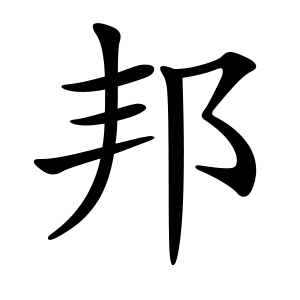邦
- country, capital city;
- feudal lord’s fief;
Etymology
It is a phono-semantic compound, combining:
邑 (eup, “village, settlement”) for the meaning;
丰 (bong, “abundant, beautiful”) for the sound.
In the past, 邦 was widely used as the character for nation (국가). However, during the transition from the Qin to the Han dynasty, Liu Bang (유방) founded the Han dynasty and became emperor. Since 邦 was part of Liu Bang’s personal name, it became subject to the naming taboo (피휘), and 國 (country, nation) came to replace it for the meaning “state.” Therefore, when 邦 is found in excavated ancient texts in places where 國 is expected, it is evidence that the text predates the Former Han dynasty.
In China, 邦 was once adopted as the simplified form (이간자, “second round simplification”) of 帮 (to help, assist), but this was later abolished. The merger happened because 帮 and 邦 are both pronounced bāng in Chinese.
Usage in Korean
Modern Korean mostly uses 국(國) instead of 방(邦) for “nation,” but 邦 survives in set compounds.
Often appears in formal, political, or historical contexts (e.g., 연방 “federation”).
Common compounds:
국방 (國防) – national defense;
연방 (聯邦) – federation;
방위 (邦位) – defense of the nation;
외방 (外邦) – foreign country.
- 手十弓中 (QJNL)
- ⿰ 丰 阝
